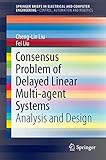Consensus Problem of Delayed Linear Multi-agent Systems [electronic resource] : Analysis and Design / by Cheng-Lin Liu, Fei Liu.
Material type: TextSeries: SpringerBriefs in Electrical and Computer EngineeringPublisher: Singapore : Springer Singapore : Imprint: Springer, 2017Description: X, 124 p. 62 illus., 3 illus. in color. online resourceContent type:
TextSeries: SpringerBriefs in Electrical and Computer EngineeringPublisher: Singapore : Springer Singapore : Imprint: Springer, 2017Description: X, 124 p. 62 illus., 3 illus. in color. online resourceContent type: - text
- computer
- online resource
- 9789811024924
- 629.8 23
Introduction -- Preliminaries -- Consensus analysis of delayed multi-agent systems -- Difference-compensated consensus algorithms -- Predictor-based consensus algorithms -- Conclusions.
In the context of coupled-coordination control mechanisms, this book focuses on the delay robustness of consensus problems with asynchronously coupled and synchronously coupled consensus algorithms respectively. Moreover, constructive consensus algorithms that tolerate larger communication delays are proposed according to idea of compensation. By providing rigorous theoretical proofs and numerous numerical simulations, it enhances readers' understanding of the consensus coordination control mechanism of multi-agent systems with communication delays.
